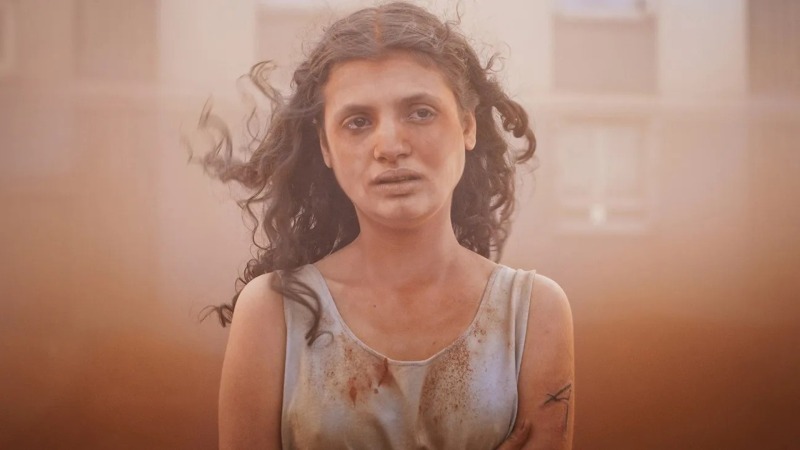Julia Ducournau’s Alpha Interrogates What It Means to Care for Others

In Alpha’s opening sequence, the title of the film emerges as cracks in a crumbling orange terrain, struggling to break through. This foretells the journey of 12-year-old Alpha; a tenacious young girl whose family is steeped in grief and despair.
Julia Ducournau’s third feature, which premiered at Cannes, is less a visual, sensory spectacle than her previous films Raw and Titane, the latter of which took home the prestigious Palme D’Or. Gone is the visceral body horror and relentless pacing that the visionary director has become known for. Here, Ducournau opts for a story both sprawling and soft — but if you’re willing to dredge through the swirling sands, it is just as complex and impactful as her previous offerings.
The film begins with Alpha, played with awkward but endearing nuance by Mélissa Boros, receiving a tattoo from a used needle. It’s an act that incites an understandable panic from her doctor mother, who immediately has her tested for “the virus”—an illness that apparently turns its victims to stone.
Flashbacks to the virus’s endemic peak 7 years earlier show Alpha’s mother caring for the overwhelming number of patients under her care alongside Emma Mackey’s nurse. Parallels to the AIDs virus epidemic are visible in queer patients and frightened hospital staff, but not central to Alpha’s story. This leaves any greater ideas around infection feeling a fair bit undercooked, if you’re seeking an AIDs allegory.
The visual effects of the infected, meanwhile, border on Doctor Who monsters, mildly cartoonish and somewhat disappointingly free of gore, but their minimal stone facades are symbolic of Ducournau’s reflections on time. As perpetually frozen statues, they cannot move on or change along with the world around them.
Ducournau explores time as both theme and filmmaking convention in Alpha, with multiple narratives, marked by distinctly polar color palettes, slowly converging and distorting the audience’s perception of events. The film really kicks into gear with the introduction of Amin — an uncle Alpha barely remembers who crashes their apartment, searching for drugs. Amin is an addict, but a beloved brother nonetheless whose presence is embraced by Alpha’s mother.
Both Golshifteh Farahani and Tahar Ramin give spectacular performances in their respective roles as sister and brother. Ramin particularly brings an immense physicality in his portrayal of addiction that is mesmerizing to watch.
And Alpha is far from the first time that Ducournau has focused on family. Familial relationships are the through line that ground all of her films. As with Raw and Titane it’s the realistic chemistry between performers and weight felt in these relationships that are one of Alpha’s greatest successes. It’s easy to imagine these characters outside of the confines of the film, sharing meals and mindlessly bickering.
The film’s main issue is in establishing its protagonist. Initially, this is Alpha’s story. The early scenes are from her perspective and the state of her infection appears to be the main hook. On the face of it, Alpha’s school life is the most interesting aspect of the film, if only because it’s the most obvious, but this story of an ostracized teen facing ridicule at school is not ultimately what takes center stage.
-

-

-

-

-

-

-

-

-

-

-

-

-

-

-

-

-

-

-

-

-

-

-

-

-

-

-

-

-

-

-

-

-

-

-

-

-

-

-

-








































